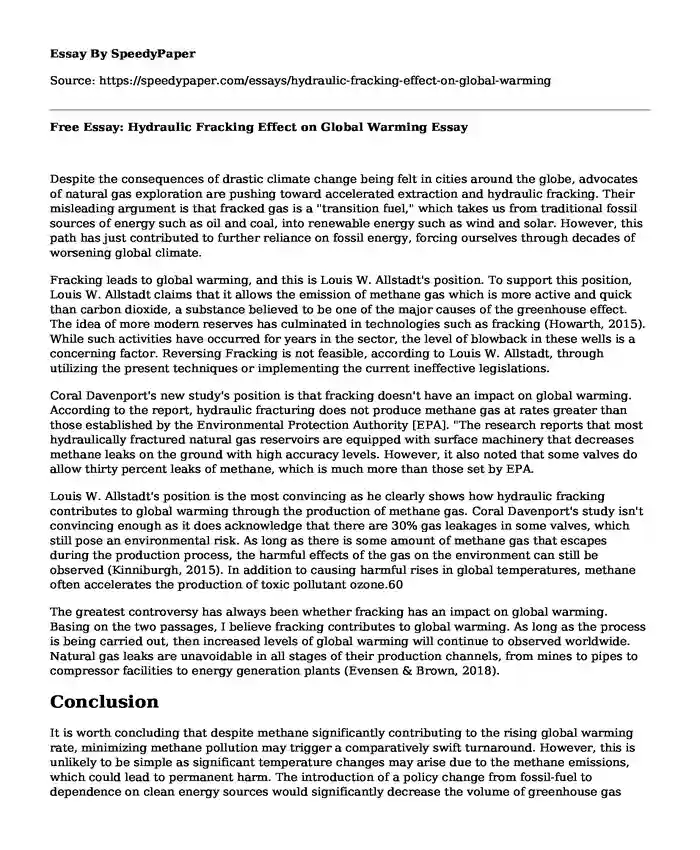
| Essay type: | Problem solution essays |
| Categories: | Ecology Energy Global warming Social issue Essays by pagecount |
| Pages: | 3 |
| Wordcount: | 628 words |
Despite the consequences of drastic climate change being felt in cities around the globe, advocates of natural gas exploration are pushing toward accelerated extraction and hydraulic fracking. Their misleading argument is that fracked gas is a "transition fuel," which takes us from traditional fossil sources of energy such as oil and coal, into renewable energy such as wind and solar. However, this path has just contributed to further reliance on fossil energy, forcing ourselves through decades of worsening global climate.
Fracking leads to global warming, and this is Louis W. Allstadt's position. To support this position, Louis W. Allstadt claims that it allows the emission of methane gas which is more active and quick than carbon dioxide, a substance believed to be one of the major causes of the greenhouse effect. The idea of more modern reserves has culminated in technologies such as fracking (Howarth, 2015). While such activities have occurred for years in the sector, the level of blowback in these wells is a concerning factor. Reversing Fracking is not feasible, according to Louis W. Allstadt, through utilizing the present techniques or implementing the current ineffective legislations.
Coral Davenport's new study's position is that fracking doesn't have an impact on global warming. According to the report, hydraulic fracturing does not produce methane gas at rates greater than those established by the Environmental Protection Authority [EPA]. "The research reports that most hydraulically fractured natural gas reservoirs are equipped with surface machinery that decreases methane leaks on the ground with high accuracy levels. However, it also noted that some valves do allow thirty percent leaks of methane, which is much more than those set by EPA.
Louis W. Allstadt's position is the most convincing as he clearly shows how hydraulic fracking contributes to global warming through the production of methane gas. Coral Davenport's study isn't convincing enough as it does acknowledge that there are 30% gas leakages in some valves, which still pose an environmental risk. As long as there is some amount of methane gas that escapes during the production process, the harmful effects of the gas on the environment can still be observed (Kinniburgh, 2015). In addition to causing harmful rises in global temperatures, methane often accelerates the production of toxic pollutant ozone.60
The greatest controversy has always been whether fracking has an impact on global warming. Basing on the two passages, I believe fracking contributes to global warming. As long as the process is being carried out, then increased levels of global warming will continue to observed worldwide. Natural gas leaks are unavoidable in all stages of their production channels, from mines to pipes to compressor facilities to energy generation plants (Evensen & Brown, 2018).
Conclusion
It is worth concluding that despite methane significantly contributing to the rising global warming rate, minimizing methane pollution may trigger a comparatively swift turnaround. However, this is unlikely to be simple as significant temperature changes may arise due to the methane emissions, which could lead to permanent harm. The introduction of a policy change from fossil-fuel to dependence on clean energy sources would significantly decrease the volume of greenhouse gas pollution to expand the usage of energy conservation in buildings. It can only be possible by putting in place a fast and effective worldwide ban from hydraulic fracking. A total shift to renewables is the only current and best way to save the world from the current climatic problems.
References
Evensen, D., & Brown-Steiner, B. (2018). Public perception of the relationship between climate change and unconventional gas development (‘fracking’) in the US. Climate Policy, 18(5), 556-567.
Howarth, R. W. (2015). Methane emissions and climatic warming risk from hydraulic fracturing and shale gas development: implications for policy. Energy and Emission Control Technologies, 3, 45-54.
Kinniburgh, C. (2015). From Zuccotti Park to Zurawlów: the global revolt against fracking. Dissent, 62(3), 42-52.
Cite this page
Free Essay: Hydraulic Fracking Effect on Global Warming. (2023, Oct 23). Retrieved from https://speedypaper.com/essays/hydraulic-fracking-effect-on-global-warming
Request Removal
If you are the original author of this essay and no longer wish to have it published on the SpeedyPaper website, please click below to request its removal:
- Export Financing in Nigeria, Problems and Prospects - Free Essay in Finance
- Free Essay on Concepts in English 1301
- The Large Intestine Research Essay Sample
- Free Essay on Fresh Water Supply in Saudi Arabia
- Integration on the Movie The Visitor, Essay Example
- Setting Analysis Based on Araby and A&P. Free Essay in Literature
- Free Essay in History on the Expansion of Mongols Rule
Popular categories




